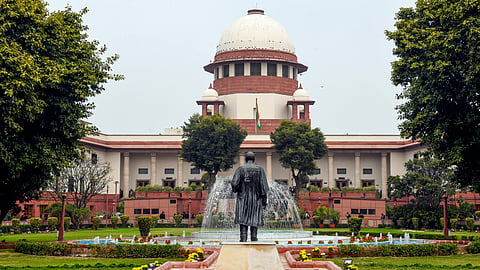

NEW DELHI: The Supreme Court in its recent verdict said that the Governor didn't have any discretionary powers, and giving the Governor absolute discretion would turn him into a "super-constitutional" figure.
"The Governor is merely a titular or de jure head of the State, and the task of governing the State is entrusted to the Chief Minister and his Council of Ministers who can be said to be the head of the State. The Governor cannot be accepted as an all-pervading super-constitutional authority," said, a three-judge bench of the apex court, led by Justice J B Pardiwala and Justice R Mahadevan.
They said this in the recent verdict pronounced on April 8 on the Tamil Nadu government's plea against the state governor, Dr R N Ravi's decision to sit over several bills passed by the State legislature.
The top court added that the Governor, in exercise of his functions under Article 200, is required to abide by the aid and advice tendered by the Council of Ministers.
The only exceptions to this rule can be traced to the second proviso to Article 200 and Article 163(1) of the Constitution.
"Thus, only in instances where the Governor is by or under the Constitution required to act in his discretion, would he be justified in exercising his powers under Article 200 contrary to the advice of the Council of Ministers. Further, any exercise of discretion by the Governor in exercise of his powers under Article 200 is amenable to judicial review," the apex court ruled.
Criticizing the Governor for sitting over several bills passed by the Tamil Nadu State legislature, the apex court, in its 415-page verdict, said, the action of the Governor has been contrary to what was laid down by this Court in S.R. Bommai, wherein it was stated that the Governor is a very high Constitutional functionary and he is supposed to act fairly and honestly, in a manner consistent with his oath.
"It is for this reason that Article 356 places such implicit faith on his report. If, however, in a given case his report is vitiated by legal mala fides, it is bound to vitiate the President's action as well," the bench said in the judgment.
Highlighting and clarifying that the Governor has a role to play for a healthy functional democracy, the apex court said, before the Governor assumes office, he undertook an oath to discharge his functions to the best of his ability in order to preserve, protect and defend the Constitution and the rule of law, along with avowing to devote himself to the service and well-being of the people of the State.
"It is imperative that all his actions be guided in true allegiance to his oath and that he faithfully executes his functions that he is entrusted with by and under the Constitution. There is a reason why a specific reference is made to the well-being of the people of the State in his oath, there is a reason why he is sworn in to pledge himself to the service of the same people," the SC said.
"The Governor as the constitutional head of the State, is reposed with the responsibility to accord primacy to the will and welfare of the people of the State and earnestly work in harmony with the State machinery," the SC added.
Allowing the plea of the TN State government, the top court said, the Governor has no independent discretion under the substantive part of Article 200 for referring the bill for the consideration of the President.
"As is crystal clear from the Constituent Assembly Debates, there is no independent discretion vested in the Governor in exercise of his functions under Article 200 of the Constitution," it added.
The Governor cannot reserve a bill for the consideration of the President when it is repassed by the State Legislature, with or without amendments, under the first proviso to Article 200, the SC added.
The bench also, in its verdict, held that his oath not only makes this mandate anything but also demands it of the Governor owing to the intimate and delicate nature of the functions that he performs and the potency of the ramifications that could ensue or be unleashed upon the State.
Due to this nature and function and role of the Governor, the top court remarked, he must be conscious to not create roadblocks or chokehold the State Legislature in order to thwart and trade the will of the people for political edge.
"The members of the State Legislature, having been elected by the people of the State as an outcome of the democratic expression, are better attuned to ensure the well-being of the people of the State," it added.
Coming down heavily on Tamil Nadu Governor Dr Ravi, the SC said reservation of 10 Bills by him for consideration of the president was in contravention of constitutional provisions.
"The Constituent Assembly debates indicate that the framers of our Constitution envisaged the position of the Governor as that of a guide, philosopher and a friend of the Government and the people in general."
"The Constituent Assembly, in its wisdom and in consonance with the position of the Governor in the parliamentary form of Government, removed the phrase in his discretion" from the substantive part," the SC said.